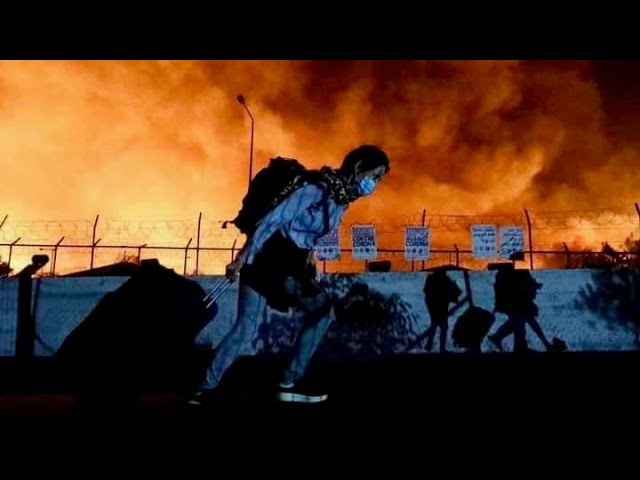On the night of Tuesday, September 8, a huge fire broke out at Camp Moria, Europe's largest refugee camp. The site on the island of Lesbos, Greece, is in effect a prison and known locally as “Hell” for the living nightmare its inhabitants are forced to endure.
Thousands of asylum seekers were displaced in the blaze, in effect restoring their freedom for the first time since their arrival. But to be released in such circumstances may cost them yet more uncertainty and hardship in the months to come.
At the time of writing, no official figures have been released on the number of people injured or killed by the fire.
***
“The officers first used tear gas and batons to prevent refugees from leaving the camp, but within minutes the entire camp was on fire. They were forced to open the way for them to leave."
An eyewitness recounted to IranWire the scenes of destruction at Camp Moria, on the Greek island of Lesbos, after it caught fire on the night of September 8.
Hundreds of refugees have since been transferred to another camp in Chios, which like the camps on Lesbos and Samos near Turkey is one of the sites asylum seekers are transferred to after being detained by Greek police, and is already badly overcrowded.
Most of the other asylum seekers at Moria have managed to leave the camp, but they currently have no shelter. This is especially worrying for children, the elderly, and sick asylum seekers in need of urgent care care.
Yesterday the EU Commissioner for Home Affairs, Yelva Johansson, announced on her personal Twitter account that she has authorized the process of immediate transfer and resettlement of young and unaccompanied migrants to mainland Greece. The European Commission for Refugees is planning to relocate around 400 children from the island to mainland Greece.
How Did the Fire Break Out?
Another eyewitness to the fire at Camp Moria said it had broken out in the forests around the island, and quickly spread to the camp. “There was a strong wind last night,” they said, “and this rapidly caused the fire to spread to the camp. All the tents, the asylum seekers' equipment and other public facilities at the camp caught fire."
Fires may break out at refugee and asylum seeker detention camps for a of reasons. Since most of these sites do not have electricity, asylum seekers often have to rig up their own electricity using non-standard wires and cables from electrical sources in the camps, and the faulty connections often lead to fires.
Another common cause of fire is the explosion of propane gas cylinders used by the refugees to prepare food. In such a tense atmosphere, night fights also sometimes break out between groups of refugees, which can lead to tents on either side of the conflict being razed to the ground. In most cases the fire brigade does not arrive at the scene until hours later, with the asylum seekers themselves forced to extinguish the fire with buckets of water and bankets.
Videos obtained by IranWire after the fire show that a large area of Camp Moria has been completely destroyed.
The Prospects for Camp Moria Before the Fire
Camp Moria is understood to have been in quarantine since the outbreak of coronavirus, with 35 cases of Covid-19 reported there during this period. The displacement of asylum seekers in the fire who might be infected, or at heightened risk of Covid-19, is therefore now a major concern.
Before the fire broke out the camp housed about 20,000 refugees – with an official capacity of just 4,000. The facilities were minimal and conditions dire. Most of those living in the camp had been stranded there for years. Their long-term detention was the result of a 2016 agreement between Turkey, the European Union and Greece, stipulating that the asylum applications of those refugees who arrived on Greek islands would be processed in the same location and returned to Turkey if they did not qualify. In return, the European Union would rehome Syrian refugees living in Turkey.
Unemployment, poverty, the spread of dangerous and contagious diseases, human and child trafficking, a lack of health and medical facilities, lack of shelter, overcrowding and inhumane treatment were rife across Camp Moria. The conditions had become so unbearable over time that some detainees had voluntarily been infected with AIDS so as to be transferred to Athens.
In April 2018, a new Greek government came to power with a manifesto to close down Camp Moria. Thousands of refugees were transferred across to Athens, but in practice this led to another crisis, with these same people then left homeless and destitute in the Greek capital with no citizenship or right to work.
At one stage the Green government also claimed that it would turn Camp Moria into a closed camp or detention center, in order to speed up the processing of asylum cases. This was met with outcry from international human and refugee rights organizations and was delayed as a result.
Now, huge swathes of Camp Moria have been devastated by fire. Thousands of homeless refugees are in limbo on the island of Lesbos. Most of these people will have dreamed of escaping Camp Moria, bitterly described as a prison; now this dream has come true it comes with an even greater deal of uncertainty than ever before.
visit the accountability section
In this section of Iran Wire, you can contact the officials and launch your campaign for various problems





























comments